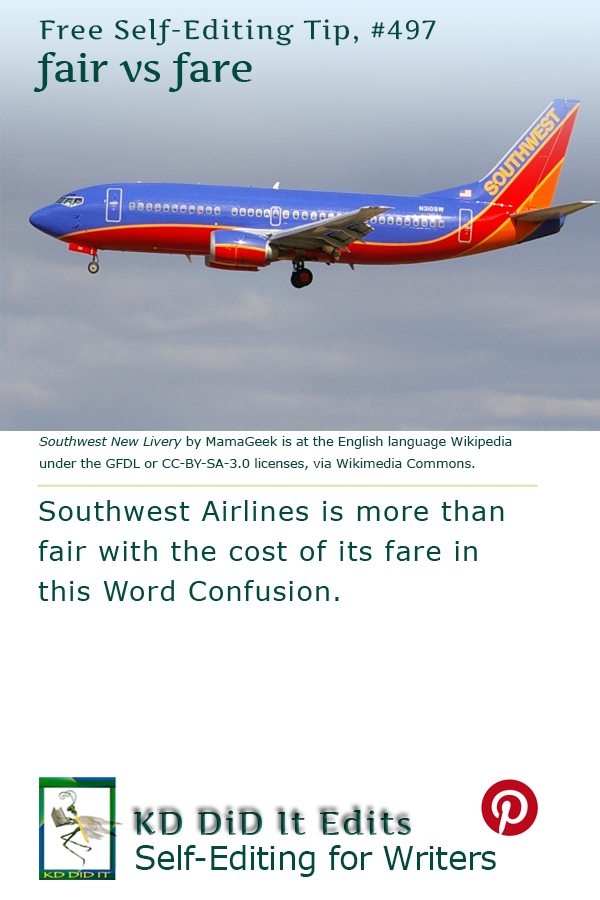Revised as of
4 July 2023
O fair maiden! How fare thee this day? is a nice way of telling a female she’s lookin’ good and asking how she’s doing today.
Now what if I turned this around with O fare, maiden! How fair this day? It sounds as though I’m first telling her to be and following it up by commenting on the weather.
Admittedly, this is a minor confusion simply because we don’t use fare much these days. Unless asking how much it costs to take a plane, train, or bus somewhere. But proper usage of any word will go a long way towards a better review on your book. I know it makes a difference for me. Throw me with a confused word, and it just irritates me. Toss a few more my way, and I start to dig in like a badger with each new mishap digging that poor book’s grave a little deeper.
Word Confusions . . .
. . . started as my way of dealing with a professional frustration with properly spelled words that were out of context in manuscripts I was editing as well as books I was reviewing. It evolved into a sharing of information with y’all. I’m hoping you’ll share with us words that have been a bête noire for you from either end.
If you found this post on “Fair versus Fare” interesting, consider subscribing to KD Did It, if you’d like to track this post for future updates.
| Fair | Fare |
|---|---|

Maywood Street Fair is Justefrain is under the CC BY-SA 3.0 license, via Wikimedia Commons. |

Chinese Buffet was photographed by w:User:Spencer195 under the GNU Free Documentation License, Version 1.2 or any later version published or the CC BY-SA 3.0 license, via Wikipedia Commons. — I find Chinese food to be very tasty fare. |
| Part of Grammar: | |
| Adjective 1; Adverb 1; Noun 1, 2; Verb, intransitive 1 & transitive 3 Plural for the noun: fairs Third person present verb: fairs |
Noun 1, 2; Verb, intransitive , 3
Plural for the noun: fares Third person present verb: fares |
| Adjective: Reasonable, just, legitimate 1 Pleasing to the eye or mind Adverb: [Dialect] To a high degree Noun: A group of stalls or rides for the purpose of amusing 2
Verb, intransitive: Verb, transitive: [Shipbuilding] To draw and adjust the lines of a hull being designed to produce regular surfaces of the correct form To adjust the form of a frame or template in accordance with a design or cause it to conform to the general form of a hull To restore a bent plate or structural member to its original form To align the frames of a vessel under construction in proper position To bring rivet holes in connecting structural members into perfect alignment [Obsolete] To make fair |
Noun: Money paid for transportation 1
A range of food, especially of a particular type 2
Verb, intransitive: Perform in a specified way in a particular situation or over a particular period of time
[Archaic] Travel |
| Examples: | |
| Adjective: Per the Copyright Office at the Library of Congress, one may use copyrighted material provided it is a fair use situation. She is quite the fair-haired one. It was a fair estate. Adverb: She’ll be fair delighted to see you. No one could say he played fair. Noun: Mom said that, if we get our chores done, we can go to the fair. The Parkers brought home six blue ribbons from the county fair! She is my lady fair. He pursued his fair down the lane. Verb, intransitive: It’s supposed to fair off toward evening. Verb, transitive: I’ll fair the hull several times because the fairing mix shrinks over time. The rivet holes are not fair. It is fully faired and race ready. |
Noun: What’s the fare to get to Albuquerque? What’s the fare, cabbie? Avoid the fare at that inn! Where can I find some delicious Provençal fare? Eh, it’s conventional Hollywood fare. Verb, intransitive: How are you faring? The party fared badly in the spring elections. Beware that it fare not with you as with your predecessor. ‘Tis a young knight fares forth on his quest. |
| Derivatives: | |
| Adjective: fair-haired, fair-market value, fair-minded, fair-sized, fair-skinned, fair-spoken, fair-trade agreement, fair-weather friend, faired, fairer, fairest, fairish Adverb: fair-mindedly, fairer, fairest, fairly Noun: fair-mindedness, faire, fairground, fairing [archaic], fairness, fairwater, fairway, fayre [pseudo-archaic] |
Adjective: fare-paying Exclamation: farewell Noun: fare-thee-well, fare-you-well, farer, farewell |
| Phrasal Verb | |
| fair off fair up |
|
| History of the Word: | |
|
|
C’mon, get it out of your system, bitch, whine, moan . . . which words are your pet peeves? Also, please note that I try to be as accurate as I can, but mistakes happen or I miss something. Email me if you find errors, so I can fix them . . . and we’ll all benefit!
Satisfy your curiosity about other Word Confusions on its homepage or more generally explore the index of self-editing posts. You may also want to explore Book Layout & Formatting Ideas, Formatting Tips, Grammar Explanations, Linguistics, Publishing Tips, the Properly Punctuated, Writing Ideas and Resources, and Working Your Website.
Resources for Fair versus Fare
Apple Dictionary.com
Collins Dictionary: fair off
The Free Dictionary: fair
Pinterest Photo Credits:
Southwest New Livery by MamaGeek is at the English language Wikipedia under the GFDL or CC-BY-SA-3.0 license, via Wikimedia Commons.


